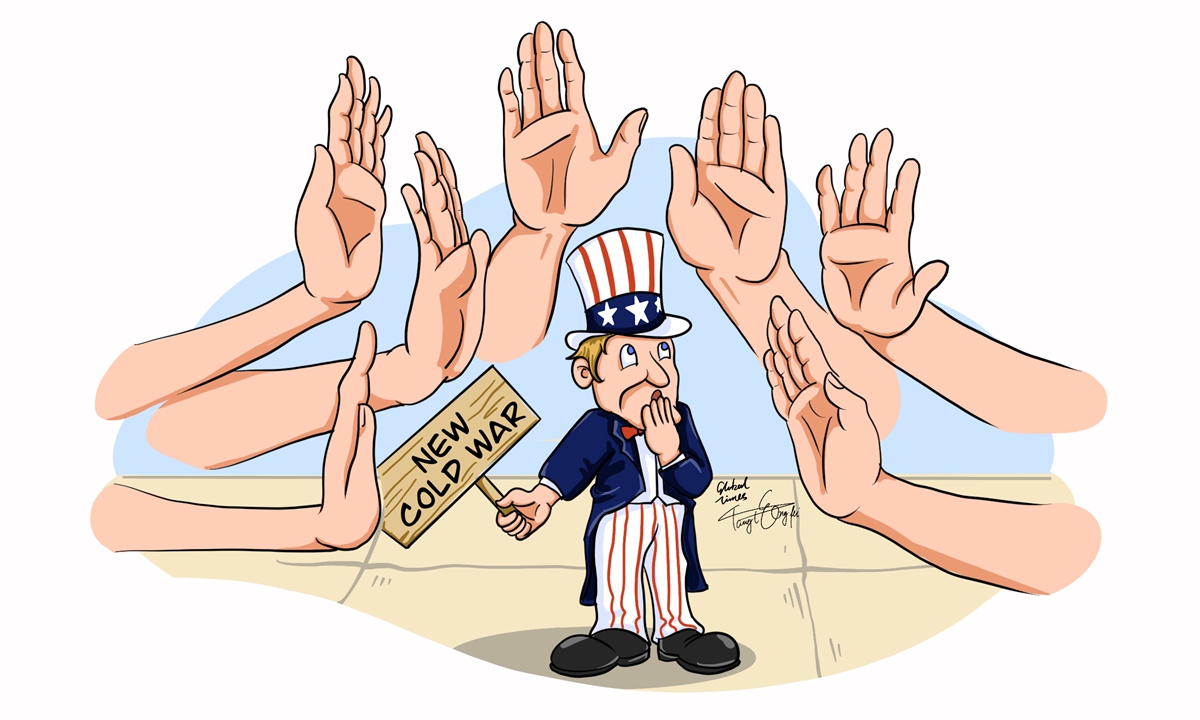Quixotic US paranoid to flex power

Illustration: Tang Tengfei/GT
"No Cold War" campaign has turned into an international movement attracting attention from millions of people. This shows the number of peace lovers around the world is increasing.
The so-called new cold war is already an outdated strategic plot made by a group of people in Washington who hope to return to the Cold War time in order to prolong the US' hegemony. But in China, such idea has no market at all. The US has repeatedly provoked China over the past three years by launching trade wars, science and technology wars, academic wars and even visa wars with China. Although China has made countermeasures, it still maintains restraint and has not overturned the overall framework of bilateral relations with the US. In my view, China and the US are not engaged in a new cold war.
Financiers and businessmen of both countries have also voted with their actions to oppose the new cold war - they have been increasing bilateral trade and investment in both 2019 and 2020.
In the US, some European countries, Australia and Canada, a number of politicians are playing the role of Don Quixote, the lost character who is trying to tilt at the windmill - that is China in their imagination. By doing so, they want to demonstrate their power and so-called courage.
There is a three-step political campaign against China. First, they have some think tanks and news agencies fabricate lies about China; such as issues related to Xinjiang, Hong Kong and cybersecurity. Second, they make public statements accusing and denouncing China over its so-called crimes to show their justice. Third, some pass anti-China acts in the congress to get more financial funds to combat China.
Such tricks and scams have long been seen through. In China, netizens usually consider these tricks as ignorant, ridiculous and naïve, knowing that they scapegoat China just to divert attention from their own mistakes in economic growth, epidemic prevention and control and human rights issues.
As I have said in previous columns, the US has waged four rounds of offensive against China over the past 70 years: the military offensive (1949-78), the ideological offensive (1978-89), the economic offensive (1992-2016), and the recent comprehensive Trump offensive.
The US itself, however, did not have any substantial gains after these offensive moves. Meanwhile, China's ability to play games with the US has been improved. Now, we have reasons to believe that China's strategic posture toward the US has completely changed: The era in which the US had been the sole superpower was over, and the true era of multipolarity has begun.
In this new era, people's ideas are becoming multipolar. The rising confidence of citizens in emerging economies, especially in the BRICS, has led to a complete collapse in the cult of the US, whose failure in fighting against the COVID-19 epidemic, selfishness in vaccines and inadequacies in domestic governance have led to a decline in its soft power. More and more countries believe that each country should follow a development path suited to its own national conditions rather than blindly follow the Western model.
Second, the world economy is becoming multipolar. Emerging economies, with their technological innovations, demographic advantages and economic potentials, will continue to prosper in the post-pandemic era. By 2030, by my estimate, the world's top 10 economies will include an equal number of emerging economies and of G7 members.
Third, global governance is becoming multipolar. Globalization will be based on regional governance. In regions outside of the West, the influence of Western countries has declined. The West can no longer manipulate these regions like it did in the past.
As for future China-US relations, it should be acknowledged that the US cannot defeat China. Although China does not want a new cold war, it has to resolutely defend its national interests. Tensions will become the new normal in China-US relations. That's something all people have to get used to.
Thus, the peace lovers of the world should unite to oppose hegemonism, promote genuine multilateralism and safeguard world peace. Humanity still faces threats to peace in the 21st century. Over the past 20 years, the wars launched by the US have caused huge disasters around the world. All countries have the responsibility to condemn the perpetrators of these disasters.
The article is abstract of Wang Wen's speech delivered at a webinar titled, "China, USA, and Brazil's quest for an independent foreign policy." It was co-hosted by the "No Cold War" campaign and Tricontinental: Institute for Social Research on Youtube on May 15. Wang Wen is a professor and executive dean of Chongyang Institute for Financial Studies at Renmin University of China. wangwen2013@ruc.edu.cn

